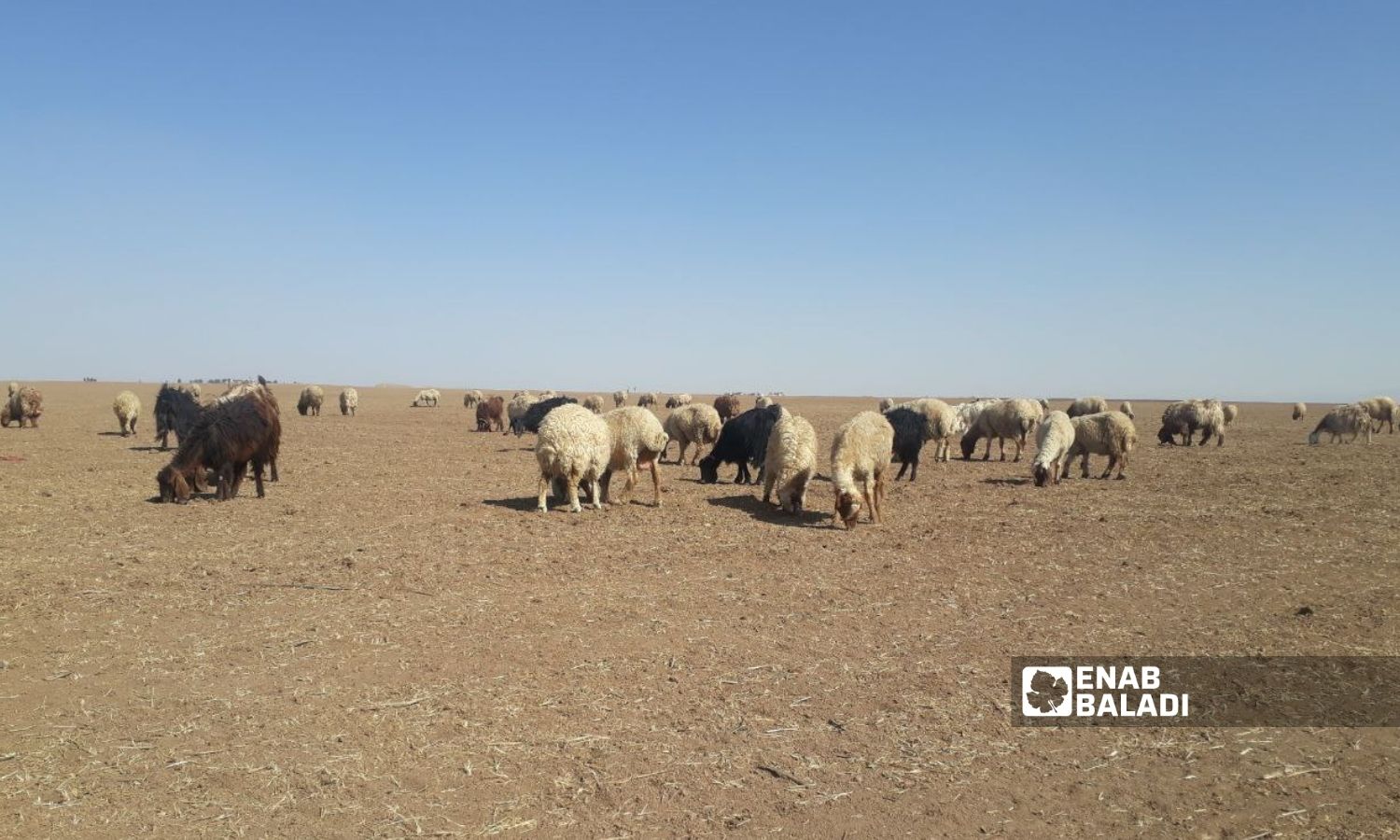



Enab Baladi – Majd al-Salem
Northeastern Syria has suffered successive droughts over the past years, which has affected the area’s productivity of strategic crops, as well as the negative impact on vegetation to the point of desertification.
Hussein al-Alyan, 70, one of the oldest farmers from the al-Qahtaniya countryside, south of al-Hasakah city, told Enab Baladi, “No one believes that this region was previously a scene of wild deer, rabbits, wolves, herds of camels and other animals that roamed the area from the southern countryside of Qamishli all the way to the Iraqi border.”
Al-Alyan expressed his sadness over the state of the region, saying, “Now, the good years have gone without return.”
Since the 1990s until now, the region known as the Syrian Jazira has been hit by about eight waves of drought, the most severe of which was in 2007 and 2008, when hundreds of farmers were unable to cultivate their land in 2009 due to the loss of their crops for two consecutive years, he added.
Al-Alyan likened the past two years to what happened in the harshest wave he mentioned, as the region suffered from a scarcity of rain and a lack of water in rivers and lakes, which also affected the growth of trees and areas of agricultural crops in the region.
The famous Mount Abdul-Aziz is located in the region southwest of al-Hasakah, and it used to include a natural reserve and diverse vegetation that included various types of trees, such as cypresses, pine trees, Atlas mastic, and various wild animals,” the agricultural engineer, Khudair al-Jalou, told Enab Baladi.
Al-Jalou, 42, of al-Hasakah countryside, clarified that a decade of recurrent drought has greatly affected the deterioration of vegetation cover and the desertification of the mountain region, and the years of conflict have turned the region into a battleground between various forces, such as the Syrian Democratic Forces (SDF), the Islamic State group and the Syrian regime forces.
There was a lot of excessive logging and a lack of responsibility by the residents surrounding the mountain for the sake of heating or commercial profit.
Also, due to the absence of any authority to deter these actions and without any attempt by the local authorities to compensate for the loss resulting from logging or to implement effective afforestation campaigns to stop the desertification of the green cover.
Al-Jalou, the agricultural engineer, noted that the drought is expanding in al-Hasakah governorate, and the borders of the precipitation zones have become more intertwined and are expanding in favor of zones with a low precipitation rate, which does not exceed 250 mm annually.
The deterioration of the green cover and the exacerbation of desertification is caused by the heavy dependence of agriculture on rainwater and the lack of good investment in other available water resources in the governorate, such as the rivers of Euphrates, Khabur, Jagjag, and Tigris) by the responsible authorities to support agriculture and afforestation in the region.
Civil associations or non-governmental organizations concerned with the environment and agricultural issues have appeared in the Jazira region in recent years, but their small number and the lack of funding and available capabilities have restricted their impact.
A civil activist active in the southern and eastern countryside of al-Qahtaniya, who asked not to be named, told Enab Baladi that “Working in the environmental field is faced with many difficulties, such as financing, as the prices of fruit and forest tree seedlings have increased dramatically, reaching the price of cypress and pine seedlings to 30,000 SYP (about 6 USD), after it was 15,000 (about 3 USD).
In light of the high-temperature rise associated with the scarcity of water and the lack of rain, according to the environmental activist, the costs of care and watering have also increased, especially during the summer.
The difficulty of permanently following up and monitoring afforestation projects over months or years until the seedlings become strong causes the loss of a large number of seedlings after each afforestation project, especially if the afforestation area is remote, and not in the heart or outskirts of cities, he added.
Also, the absence of environmental culture, and the residents’ giving priority to securing the basic requirements of life as a result of the deteriorating economic conditions, made the associations working in this field vulnerable to criticism by some societal groups “under the pretext that securing a loaf of bread and distributing food baskets to the population” takes priority over afforestation, according to the activist who works in one of the local environmental associations.
Regarding solutions, the worker explained that combating desertification requires official attention and political will, which brings in abundant funding so that there is a visible impact.
The role of the authorities, according to him, is limited to planting a roundabout on a road or planting some fruit trees in gardens and “taking lots of pictures.”
Al-Hasakah’s area is about 2.33 million hectares, of which 3.67% is forested land.
The northeastern governorate is divided into five precipitation zones, with an average rainfall of 600 mm in the first zone, decreasing to 200 mm in the Badia region, according to the investment map published by the Syrian regime.
if you think the article contain wrong information or you have additional details Send Correction